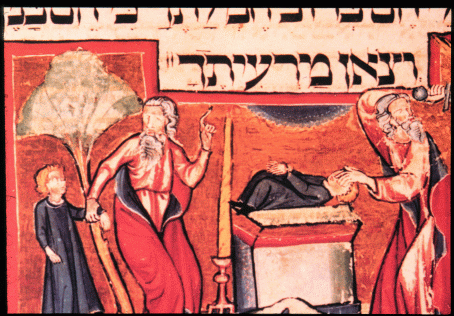This week’s Torah reading is Vayeira (וַיֵּרָ֤א—”And he appeared”) Genesis 18:1-22:24. It includes the promise that Sarah would have a son, Isaac or Yitzak—a boy named “laughter” because Sarah (who was 90 in the biblical narrative) laughed when she heard it. I suppose, in this regard, he could have easily been called named Yivkeh, “weeping”.
Reading Overview
Chapter 18 contains the promised birth of a son through Sarah through three visitors (One of whom is apparently YHWH). It also contains Abraham’s pressing intercession for Sodom and Gomorrah. chapter 19 is the destruction of Sodom and Gomorrah and rescue of Lot’s family (and death of Lot’s wife), the troubling incestuous rape of Lot by his daughters afterwards. In chapter 20 Abraham once again deceptively offers Sarah up as his “sister” to a foreign ruler for protection (or at least intentionally not fully clarifying), and once again God intervenes on Sarah’s behalf: God speaks to the ruler, Abimelekh, revealing to him that Sarah is Abraham’s wife. Abimelekh then confronts Abraham with his deception, and then blesses him with livestock and material goods before sending him out. In chapter 21 Isaac is born, and Hagar and Ishmael are also cast out by Abraham and Sarah, but protected and blessed by YHWH. Finally, in chapter 22, we have the Aqedah, the binding and near sacrifice of Isaac and God’s provision of a ram in his place.
Opening Thoughts
These chapters (18-22) are full of both good and very difficult material. We find the promise of Isaac, his birth, but we also find the Aqedah, the “sacrifice of Isaac”. Of course, in the story Isaac is spared (at the last minute) and a ram is provided in his place by YHWH . This takes place on Mount Moriah, which is traditionally understood to be the location where the Temple would be built centuries later (see 2 Chronicles 3:1). God’s instructions to Abraham regarding Isaac are troubling, even if the sacrificial provision is great. Also in these chapters are Abraham’s intercession (even humble challenge) to YHWH concerning the plans to destroy Sodom and Gomorrah, and one wonders why Abraham did not make a similar intercession/challenge regarding his own son. The book of Hebrews says that Abraham’s obedience in this situation was founded upon his belief in the resurrection:
By faith Abraham, when he was tested, offered up Isaac, and he who had received the promises was in the act of offering up his only son, of whom it was said, “Through Isaac shall your offspring be named.” He considered that God was able even to raise him from the dead, from which, figuratively speaking, he did receive him back.
(Hebrews 11.17–19 ESV)
